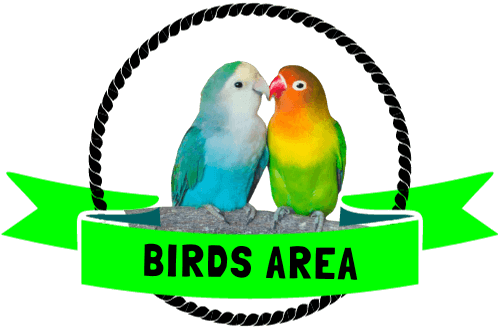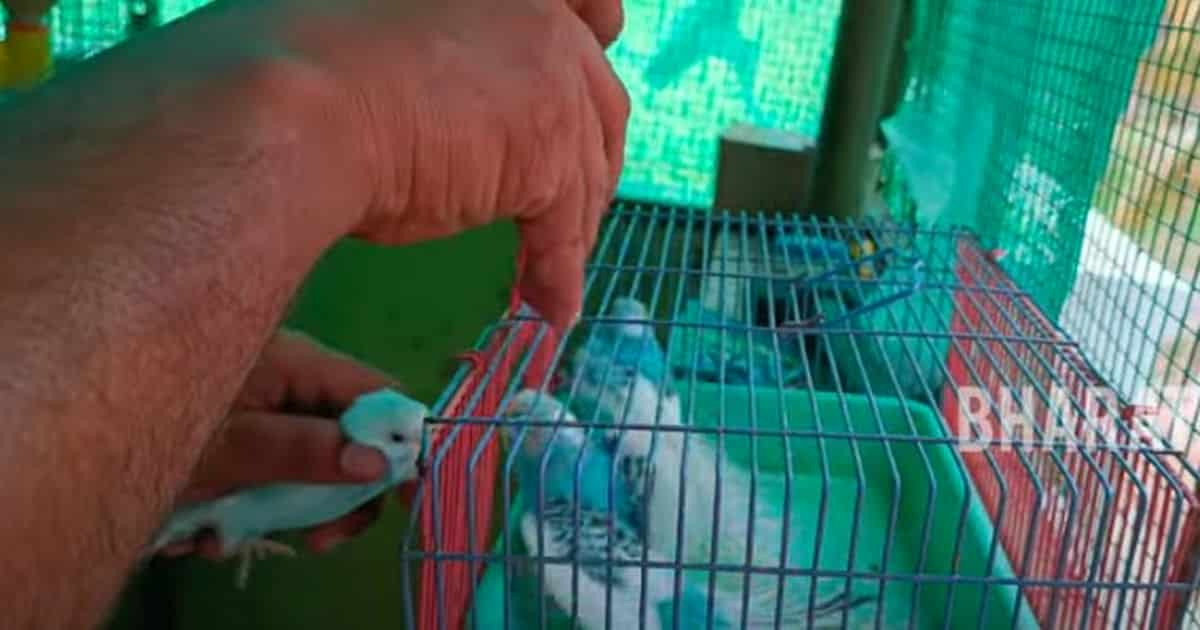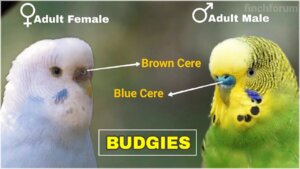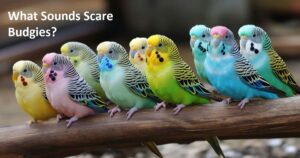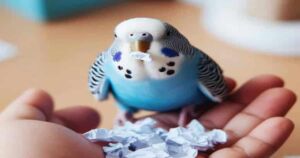When Can Baby Budgies Be Separated from Parents?
When it comes to raising baby budgies, there are many questions that new owners may have. One of the most common questions is when can baby budgies be separated from parents.
Ideally, baby budgies should be separated from their parents between 6 to 8 weeks of age, which is when they start showing increased independence and can eat solid foods on their own.
However, in the wild, baby budgies stay with their parents until they are around 4-6 months old, during which time they learn essential survival skills from their parents.
However, In the following blogs, I explore the signs that indicate when it might be appropriate to separate them, how to safely separate baby budgies and the potential risks of early separation. Also, I am discussing how separation affects budgie behaviour and the post-separation care that baby budgies require.
Key Takeaways
- Baby budgies can be separated from their parents around 6 to 8 weeks of age when they start showing increased independence and can eat solid foods on their own.
- Before separating baby budgies from their parents, it is vital to consider their level of dependence, signs of readiness, and how to separate them safely.
- Early separation can have potential risks and affect budgie behaviour, so providing post-separation care for baby budgies is crucial.
When Can Baby Budgies Be Separated from Parents?

Separating baby budgies from their parents requires careful consideration to ensure their well-being and successful transition. The ideal age to separate baby budgies from their parents is around 6 to 8 weeks when they start showing increased independence and are fully weaned.
At this age, they can eat solid foods and forage for their own nourishment, a crucial skill for survival in the wild.
However, it’s important to note that separating baby budgies from their parents too early can adversely affect their physical and emotional development.
On the other hand, delaying separation for too long can lead to behavioural issues and difficulty adjusting to new environments.
When separating baby budgies from their parents, it’s essential to do it gradually to minimize stress and ensure a successful transition. One option is to keep them in their parents’ cages but provide them with food and water dishes.
In addition, this allows them to continue interacting with their parents while learning to be more independent.
Another option is to move them to a separate cage in the same room as their parents. However, this allows them to see and hear their parents, providing comfort and reducing stress during the transition.
Overall, the ideal age to separate baby budgies from their parents is around 6 to 8 weeks when they are fully weaned, showing increased independence.
Gradual separation and a comfortable environment can help ensure a successful transition for the baby budgies and their parents.
Budgie Growth Stages
Explore the fascinating journey of budgie growth stages, from hatchlings to independent flyers. Witness their adorable transformations and learn about their milestones. For a visual treat, watch the video now!”
Signs Baby Budgies Are Ready for Separation
When it comes to separating baby budgies from their parents, it is vital to do so at the right time.
Here are some signs that indicate when baby budgies are ready for separation:
1. Eating on Their Own
Baby budgies can be separated from their parents around 6 to 8 weeks of age when they start showing increased independence and are eating independently.
At this point, they have learned essential skills from their parents and are ready to begin their individual journeys.
2. Forming a Strong Bond With Their Own Parents
Another sign that baby budgies are ready for separation is when they have started to form a strong bond with their parents and are less dependent on them for feeding and brooding. However, this typically happens around 7-8 weeks old.
3. Becoming More Active And Playful
As baby budgies grow, they become more active and playful. When they start to explore their environment and show interest in toys and other objects, it is a sign that they are ready for separation.
4. Aggressive Behavior From Parents
If the parents become aggressive towards the baby budgies, it may be time to separate them to prevent any harm. Separate the chicks from aggressive parents to create a safe environment to grow without fear.
However, it is essential to note that separating baby budgies from their parents is a delicate process that requires care and attention to the bird’s well-being.
By waiting until the right signs are present, the separation process can be smoother and less stressful for both the baby budgies and their parents.
How to Safely Separate Baby Budgies?

Safely separating baby budgies requires a delicate approach to ensure their well-being. Follow these steps for a stress-free process:
- Timing is Crucial: Separate baby budgies from their parents when they are around 6 to 8 weeks old. They are more independent and can adapt to a new environment at this age.
- Prepare a New Home: Set up a separate cage with appropriate perches, food, and water. Ensure the environment is warm and draft-free.
- Gradual Introduction to Solid Food: Start introducing solid food to the baby budgies a few days before separation to ensure they are accustomed to eating independently.
- Quiet and Calm Environment: Choose a quiet, stress-free location for the new cage. Avoid placing it too close to the parents’ cage to minimize distress.
- Gentle Handling: Handle the baby budgies with care during the separation. Use a soft cloth or your hands, moving slowly to minimize stress.
- Monitor and Provide Comfort: Keep a close eye on the separated budgies. Ensure they are eating, drinking, and adapting well. Offer comfort items like familiar toys or mirrors.
- Regular Health Checks: Schedule regular check-ups with an avian vet to monitor the health and development of the separated budgies.
- Sibling Companionship: If you have multiple baby budgies, consider separating them to provide companionship and reduce loneliness.
- Gradual Introduction to the New Cage: Allow the baby budgies time to explore their new cage at their own pace. Introduce them gradually to prevent stress.
- Maintain Parental Contact: If possible, keep the separated budgies within sight or hearing distance of their parents to provide familiarity.
Remember, each budgie is unique, so observe their behaviour and adjust your approach accordingly. You can ensure a smooth and safe separation process for baby budgies with patience and a gentle touch.
Potential Risks of Early Separation

Separating baby budgies from their parents too early can lead to potential risks and problems. In addition, it is essential to consider these risks before deciding to separate them.
Here are some of the potential risks of early separation:
- Socialization issues: Baby budgies separated too early from their parents may not learn important socialization skills. This can lead to behavioural problems such as aggression, fear, and anxiety. They may also have difficulty bonding with other budgies in the future.
- Health issues: If baby budgies are not fully weaned when separated from their parents, they may not receive the proper nutrition they need to grow and develop properly. This can lead to health problems such as malnutrition, stunted growth, and weakened immune systems.
- Emotional issues: Baby budgies who are separated too early from their parents may experience emotional distress and loneliness. They may become depressed or develop separation anxiety, which can lead to self-destructive behaviours such as feather plucking.
- Behavioural issues: Baby budgies separated too early from their parents may develop behavioural issues such as biting, screaming, and feather plucking. They may also have difficulty adjusting to their new environment and may be more prone to stress and anxiety.
How Does Separation Affect Budgie’s Behavior?

When baby budgies are separated from their parents, it can significantly impact their behaviour.
Here are some ways that separation can affect budgie behaviour:
Fear and Anxiety
Separation from their parents can cause baby budgies to feel fearful and anxious.
This is because they have lost their sense of security with their parents. They may feel lost and unsure of what to do without their parents to guide them.
Socialization
Socialization is an essential part of a budgie’s development. When separated from their parents, they may struggle to develop social skills. In addition, this can make it challenging for them to interact with other birds and humans.
Eating Habits
When baby budgies are first separated from their parents, they may struggle with eating independently. This is because they are used to being fed by their parents.
Also, it is essential to monitor their eating habits and ensure they get enough food.
Playfulness
Budgies are playful birds, and separation from their parents can affect their ability to play. They may become less active and less interested in playing with toys.
Vocalization
Budgies are known for their ability to mimic sounds and talk. Separation from their parents can affect their vocalization skills. They may be less likely to mimic sounds or talk without the guidance of their parents.
Overall, separation from their parents can significantly impact a baby budgie’s behaviour. It is essential to monitor their behaviour and provide them with the necessary care and attention to help them adjust to their new environment.
Post-Separation Care for Baby Budgies

Once baby budgies have been separated from their parents, providing proper care is essential to ensure they continue to thrive.
Here are some tips for post-separation care:
Feeding
Baby budgies should be fed a well-balanced diet that includes a variety of fresh fruits, vegetables, and high-quality pellets.
However, it’s important to avoid feeding them foods high in fat, sugar, or salt, as these can harm their health. Also, it’s essential to provide them with fresh water every day.
Housing
Baby budgies should be housed in a clean, spacious cage that allows them to move freely. The cage should be equipped with perches, toys, and other accessories to provide them with mental and physical stimulation.
However, cleaning the cage regularly is essential to prevent the buildup of harmful bacteria.
Socialization
Baby budgies are social animals and should be provided opportunities to interact with other budgies and humans. However, handling them gently and frequently is essential to help them become comfortable with human interaction.
Also, providing them with opportunities for exercise and playtime outside of their cage is essential.
Health
Baby budgies should be monitored closely for any signs of illness or injury. It’s essential to provide them with regular veterinary check-ups to ensure they are healthy and receiving proper care.
Any concerns about their health should be addressed promptly to prevent further complications.
By following these tips for post-separation care, baby budgies can continue to thrive and live happy, healthy lives.
Frequently Asked Questions
How long can budgies live alone?
Can I put a baby budgie with an old one?
What day do baby budgies open their eyes?
What do baby budgies eat?
Do baby budgies need darkness?
What is a good name for a budgie?
Final Overviews
It is generally recommended to wait until baby budgies are at least eight weeks old before separating them from their parents.
However, this allows them to develop correctly and ensures they are ready to be independent. Also, it is crucial to be gentle and careful when handling baby budgies, as they are fragile at this stage.
Remember to prioritize the well-being and development of the young budgies when deciding the appropriate time for separation from their parents.
